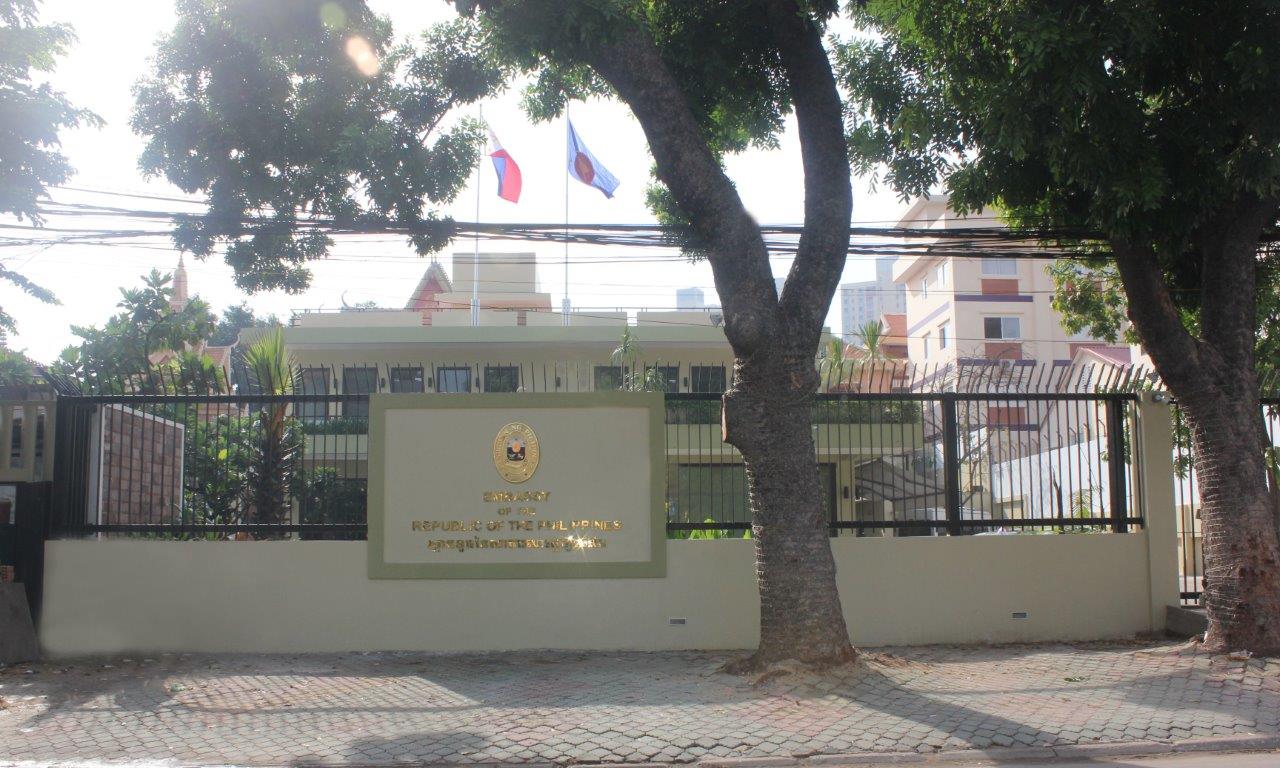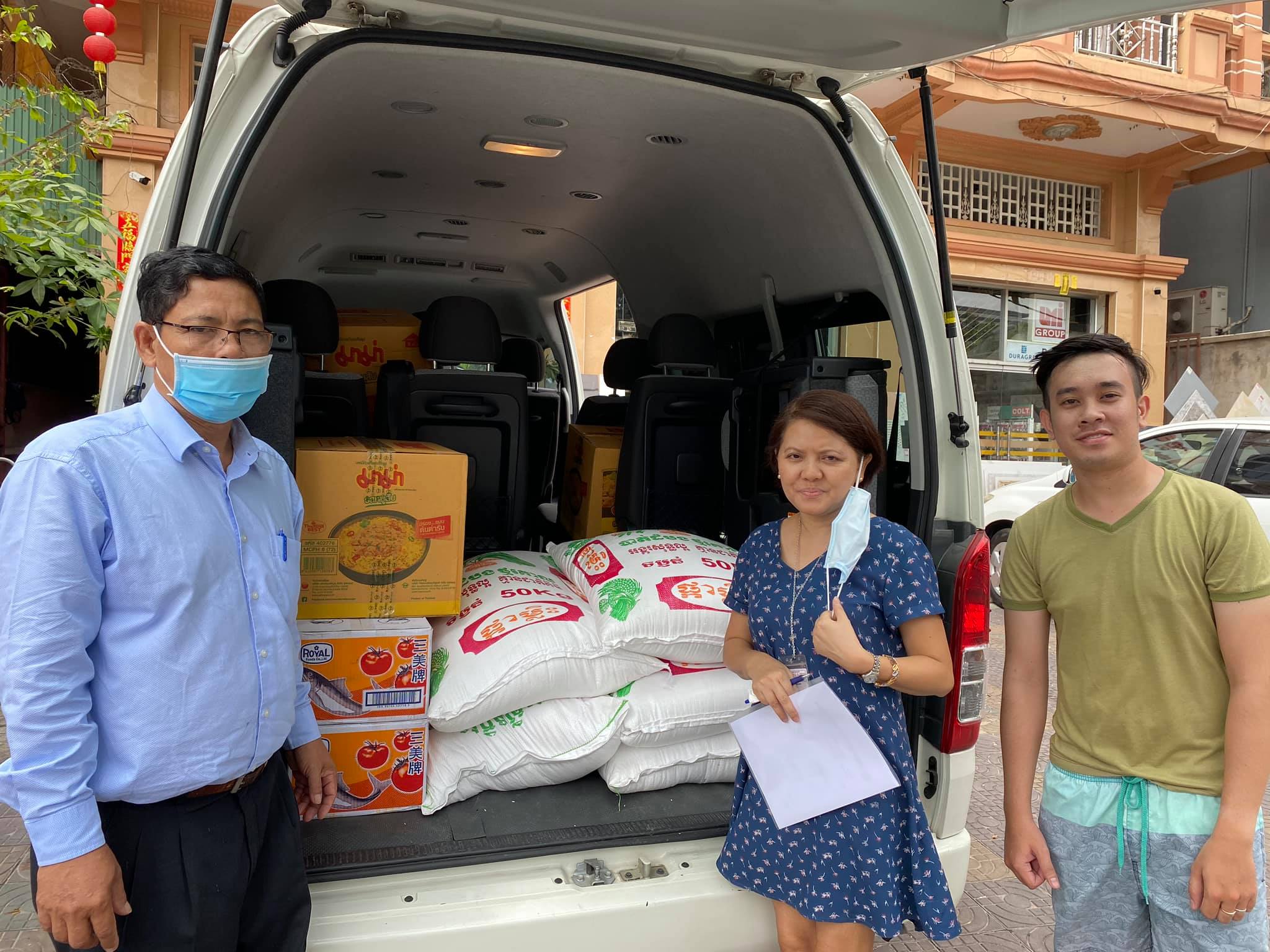Filipinos get option to stay in Cambodia, which has zero COVID-19 death, or return to PH

The Philippine Embassy in Phnom Pehn
Bangkok, Thailand—The Philippine Embassy in Cambodia has extended the deadline for Filipino workers there to opt for repatriation although the threat of COVID-19 in Cambodia, which has no recorded death because of the disease, was not as menacing as in the Philippines.
On its Facebook page, the embassy set the tentative schedule of a flight to the Philippines on April 12, Easter Sunday. No time for the flight has been set, though.
All Filipinos opting to return to the Philippines, which has more cases of COVID-19 than Cambodia, will be picked up at Phnom Penh International Airport and land at Ninoy Aquino International Airport in Manila.
Arrangements for the repatriates’ return to their provinces in the Philippines should be made with their relatives. There is no clear reintegration program for the repatriates, however, but the Philippine government is requiring all Filipinos returning from abroad to go on a 14-day quarantine before they go home to their families.
In an e-mail, Myca Magnolia M. Fischer, Chargé d’Affaires, said seats are limited in the repatriation program.
Article continues after this advertisement“We needed to prioritize those who lost their jobs and do not have the means and support system to continue living in Cambodia, as well as others with special needs,” Fischer said.
Article continues after this advertisement“At this time, we are still finalizing the list of repatriates,” she said.
Fischer added that the embassy was preparing care packages for Filipinos who would opt to stay behind in Cambodia.

Food packs ready for distribution. Photo courtesy of SAMAPI
Filipinos in Cambodia
According to Fischer there are about 7,000 Filipinos in Cambodia. At least 80 percent are in Phnom Pehn and nearby provinces. They work as teachers, academic professionals, managers and supervisors in garment factories, engineers and architects, musicians, musicians and development workers.
Like in most countries in the Mekong Region, Cambodia allows Filipinos to enter as tourists and obtain EB, or business, visas and work permits after entry.
“Filipinos are well regarded by Cambodians for their skills, professionalism, and competence,” Fischer said in her e-mail.
“The nurturing and caring nature of Filipinos is evident and given value by most employers who prefer to employ them as teachers, nurses, and other professions in the services sector,” she said.
“Generally, OFWs in Cambodia are provided with comparatively good compensation packages and working conditions,” Fischer added.
Romyr Libo-on, managing director of Arise Agency, and the national director of Miss Universe Cambodia, has been living in Phnom Penh for 13 years now. He used to be a teacher in Thailand but frequent visa runs made him move to Cambodia.
Libo-on is president of SAMAPI (Samahan ng mga Pilipino sa Cambodia), the only formally-organized group of Filipinos in Cambodia. It partnered with the Philippine Embassy in the food drive for displaced Filipinos.
In spite of the relatively comfortable conditions of the Filipinos in Cambodia, the lack of medical insurance and social security pension coverage is the biggest problem they are facing, particularly now.
Under the Cambodian Labor Law, companies are required to enrol their workers in Cambodia’s National Social Security Fund (NSSF), which also provides health care. But it is not always the case.
Fischer said OFWs are required to register their work contracts in the Philippine Embassy to obtain Overseas Employment Certificate. The embassy looks for provisions for health care, which is a requirement, too, said Fischer.
“If the provision is not there, we ask the employers to enrol their workers in NSSF or get medical coverage for them,” she said.
She added that the embassy was also encouraging SAMAPI to offer medical insurance to OFWs “which they are doing right now.”
Embassy’s Intervention
Aside from arranging the Filipinos’ repatriation, the Philippine Embassy also requested Cambodia’s Ministry of Foreign Affairs and International Cooperation for automatic renewal of visas of Filipinos who opt to stay behind or are not accommodated in the repatriation flight because of limited seats.
The embassy also requested the General Department of Immigration to allow some flexibility for overstaying Filipinos who are unable to pay their penalties but wish to join the repatriation program
On April 3, the Cambodian government granted automatic extension of tourist visas (Visa T) and exemption from payment of overstay fines to foreign tourists who arrived in Cambodia after Jan. 1, 2020 and who have not been able to return to their countries because of suspension of flights.
The exemption from payment of overstay fines will be granted until the foreign tourists are able to depart Cambodia.
The Philippine Embassy also requested some employers to allow their Filipino employees to stay in their staff houses until the embassy is able to make alternative arrangements for them.
Prior to the declaration of COVID-19 as pandemic on March 11, the Philippine Embassy has been issuing relevant advisories on the situation in Cambodia, and providing tips from WHO, DOH and the Cambodia’s Ministry of Health.
The embassy organized a training session through FB Live by Filipino medical professionals on precautionary health measures they can adopt to protect themselves from the COVID SARS 2 virus, which causes COVID-19.
On March 16, the Cambodian government ordered the closure of all schools and universities nationwide, after the first case in January. Nightclubs, cinemas, casinos, and gyms and fitness centers, massage parlors and spas are ordered closed to discourage people from gathering until further notice.
Cambodia has only 119 COVID-19 cases, 68 recoveries and no death. But still, Cambodian Prime Minister Hun Sen ordered a seven-day travel ban across the country to prevent the spread of COVID-19.
This excludes the travel of essential goods, hospitals and military transports. The travel restriction coincides with the 3-day Khmer New Year Festival set April 13 to 15 which had already been cancelled.
Edited by TSB
For more news about the novel coronavirus click here.
What you need to know about Coronavirus.
For more information on COVID-19, call the DOH Hotline: (02) 86517800 local 1149/1150.
The Inquirer Foundation supports our healthcare frontliners and is still accepting cash donations to be deposited at Banco de Oro (BDO) current account #007960018860 or donate through PayMaya using this link.